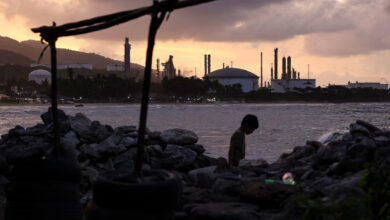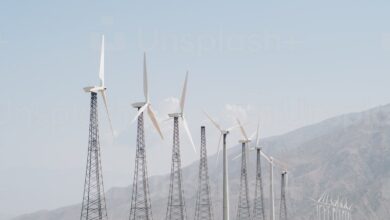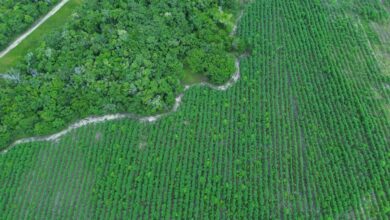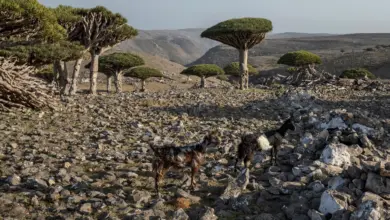Dahab, a coastal town in South Sinai, is embroiled in allegations of inadvertent damage being done to its coral reefs.
Well-known for its reefs, the town is an attraction for divers in particular, and for those seeking to enjoy nature’s beauty. The clear, turqoise water has a hypnotizing effect, making you want to swim, regardless of your aquatic skills. At night, the moon casts a magnificent shadow over the water, using it as a mirror to draw playful, cheerful shapes. Surrounded by such allurements, we still regarded this as a professional journey to uncover the truth of this small town.
It takes eight hours to travel from Cairo to Dahab, interrupted by only one stop to use what is supposed to be a restroom. The vendors at this “rest house” sell juices and sandwiches at double or triple the normal price. Upon our arrival in Dahab, a friend drives us to a downtown hotel in the Al Assla area, a name pronounced differently by Bedouins as opposed to town residents.
Minutes later, as we drive on, the car sinks in a ditch of water, whose smell clearly signals where it is coming from. Dahab–which is located 100km from Sharm El Sheikh and the Israeli city of Eilat in either direction–is in fact drowning in sewage. The sewage system is now overloaded because of the rising number of hotels and resorts in the area.
Dahab is a town with historical significance. It was mentioned in the Old Testament as one of the places where the Jews passed during their journey through Sinai. The Crusaders built the Coral Castle, known to Egyptian as Salah Eddin Citadel.
But the town was largely neglected until the late twentieth century, when the government decided to build facilities and develop the town to attract investment. The cheapest tourist destination on the Sinai coast, it has attracted a lot of foreign tourists, and ranks as the second most visited destination in the area after Sharm El Sheikh.
Some of the most wonderful writings about Dahab can be found on the blogs of foreign tourists or in travel guides, which describe the town and its tourist attractions.
But in several conversations with divers and swimmers who came from all over the world to visit Dahab, they all lament that Egyptians know very little about this town whose uniqueness and charm deserves more attention.
Charles, a 50-year-old American from Texas, easily counts the diving spots throughout Egypt’s Red Sea coastal area, describing their histories and pointing out where the rarest corals can be found. "Everyone knows that two thirds of the world’s ancient monuments are in Egypt, but can you tell me the number of coral reefs in your sea?” he asks.
He doesn’t want an answer to his rhetorical question. "You need only to learn how to dive in order to discover for yourself," he continues. "Egyptians are proud of their 5000-year-old pyramids, but not the corals that are over five million years old! You don’t know how lucky you are.”
Minutes later we decide to meet this challenge and go diving to explore the underwater scene that has everyone talking. But we face two obstacles: First, we must learn how to dive, which normally takes a week minimum, in cold water with waves as high as three meters. Second is the difficulty of taking pictures underwater. With some simple arrangements these two obstacles are solved.
The best time to dive is from 9AM to 3PM; after that underwater vision becomes blurry, and the water gets much colder. We start at the lighthouse and walk 50 meters before encountering a steep slope.
Divers lay on their stomachs over the water surface, using air tanks and masks that improve underwater vision. Water bubbles generated by arm movements slightly hinder the diver’s vision but only for a few seconds, after which one is immediately taken by the clear sight of water and other surrounding swimmers.
The coral reefs in this area look outstanding. They are living creatures that form a huge mountain under water, most of which were formed before the existence of human beings on Earth. Jessica Robert, a Swiss environmental activist who dedicates most of her time to spreading awareness on the protection of aquatic life in Dahab, said that the coral reefs grow one centimeter every ten years.
"You must remember that diving without the necessary equipment can mean instant death," warns Robert Funder, manager of a diving center in Dahab. "Deep water pressure can cause internal bleeding or loss of consciousness while a sudden ascent to the surface may cause the explosion of lungs.” He warns that the excitement of diving leads many to forget about the necessary precautions.
Another diver explains to us that both the cement and plastic material are dangerous to aquatic creatures: “Corals are like animals, though many people mistake them for plants or rocks, and the plastic bags and bottles suffocate the corals by closing their pores.”
Cement remains, on the other hand, are poisonous and kill corals very quickly. Several confrontations have taken place between environmental activists and coffee shop owners in the area who violate their licenses by building annexes in the water.
"The problem is that you cannot demolish these annexes because the cement remains will be carried by the waves to the corals, nor can you keep them as decay over time will have the same effect," says the diver. "The only option is to protect the coral reefs from within."
The young diving instructor is a sea lover who found in Dahab the best diving sites in the whole world. According to him the most beautiful sites are the “Blue Hole” and the “Island.”
We noticed that the names of these sites are all in English seeing that the English were the first to explore them. Other places further from the shore have Bedouin names, such as el-Masbat, el-Mashrqa and el-Zarnouq.
On the other side of the shore, the scene is stark. Dead corals are a common sight, a result of pollution and people who cut parts of the reefs to sell or to take as souvenirs.
After this journey we return to the Swiss activist, Jessica Roberts, who confirms that some hotels now provide visitors with special bags to reduce the use of plastic bags and bottles. As for the coffee shop owners, she accuses them of destroying the town’s source of revenue and she criticizes the municipal council for its failure to prevent these violations.
"Under the sea we used to see heaven on Earth. Seahorses existed near the shore in all colors and sizes and dolphins used to swim only 100 meters from here. It felt like the inside of an aquarium," she says. "All this beauty is escaping–Dahab must be protected in order to retain its charm."
Translated from the Arabic Edition.




